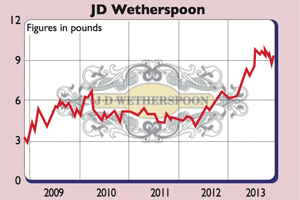Company in the news: JD Wetherspoon
Profits margins at pub chain Wetherspoon are under pressure, says Phil Oakley. Should investors be worrying?
Get the latest financial news, insights and expert analysis from our award-winning MoneyWeek team, to help you understand what really matters when it comes to your finances.
You are now subscribed
Your newsletter sign-up was successful
Want to add more newsletters?

Twice daily
MoneyWeek
Get the latest financial news, insights and expert analysis from our award-winning MoneyWeek team, to help you understand what really matters when it comes to your finances.

Four times a week
Look After My Bills
Sign up to our free money-saving newsletter, filled with the latest news and expert advice to help you find the best tips and deals for managing your bills. Start saving today!
JD Wetherspoon (LSE: JDW)has been a very good long-term investment. Its strategy of selling good-value food and drink in nice pubs has been a hit with customers, if not with the local competition. However, recently investors have become worried that the company's profit margins (the amount of sales it turns into profit) will keep falling. Last week's trading statement did nothing to allay their fears.
Sales growth in Wetherspoon pubs has been slowing, but sales are still up 9.4% so far this year. However, in recent weeks, food sales have grown but drinks sales have not. The company's outspoken founder and chairman, Tim Martin, blames this on the fact that food sold in supermarkets does not incur VAT, which allows them to sell cut-price alcohol. This puts pressure on profit margins, along with the company's decision to give its staff above-inflation pay increases.
But should investors be fretting? Yes, Wetherspoon's profit margins were 10% five years ago, compared with 7.3% now. But the company remains very well run, accounting is prudent, and it's a phenomenal generator of cash. Wetherspoon's free cash flow per share is consistently higher than its earnings per share, which is a very good sign. At 812p, the shares trade on 11 times last year's free cash flow, which should keep on growing.
MoneyWeek
Subscribe to MoneyWeek today and get your first six magazine issues absolutely FREE

Sign up to Money Morning
Don't miss the latest investment and personal finances news, market analysis, plus money-saving tips with our free twice-daily newsletter
Don't miss the latest investment and personal finances news, market analysis, plus money-saving tips with our free twice-daily newsletter
Verdict: buy
Get the latest financial news, insights and expert analysis from our award-winning MoneyWeek team, to help you understand what really matters when it comes to your finances.
Phil spent 13 years as an investment analyst for both stockbroking and fund management companies.
-
 Should you buy an active ETF?
Should you buy an active ETF?ETFs are often mischaracterised as passive products, but they can be a convenient way to add active management to your portfolio
-
 Power up your pension before 5 April – easy ways to save before the tax year end
Power up your pension before 5 April – easy ways to save before the tax year endWith the end of the tax year looming, pension savers currently have a window to review and maximise what’s going into their retirement funds – we look at how
